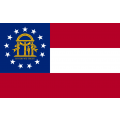For our 2024 rankings, the research team at Nursing Schools Almanac collected data on nearly 3,000 nursing schools and campuses throughout the United States. We evaluated each school on three dimensions:
Georgia
We've organized a comprehensive list of Georgia nursing schools. Below you'll find information on specific nursing programs such as LPN certificates and ADN, BSN, and MSN degrees. You'll also find a profile of nursing education and careers in each major Georgia city.
Georgia nursing programs and careers
City-specific information
Augusta’s prospective nurses can pursue one of several different roles. The three most important roles in the city’s nursing profession are certified nursing assistant (CNA), licensed practical nurse (LPN), and registered nurse (RN). Each role requires a distinct educational pathway, and all are available at a number of educational institutions throughout Augusta.
Master of science in nursing (MSN) programs are an ideal route for existing nurses to further their careers in specialized fields. Georgia has a wide range of MSN programs, many tailored to specializations like nursing administration, nursing education, and family practice nursing. For example, Brenau University offers all three of these specializations. Emory University in Atlanta offers nine distinct MSN programs, including specializations in geriatric nursing and nurse midwifery. Brenau and Emory are just two of the over 15 Georgia schools which offer MSN programs.
When planning a nursing education path, prospective students often focus on the "here and now" and place cost at the top of their considerations. And while cost certainly is an important factor, we encourage nursing students to think of this education as an investment. In investing, the best strategies involve a long-term outlook. Nursing is no different. Though costs may be considerable in the short term, the return on investment can be considerable as well.
Entry-level nursing jobs can be achieved through a two-year (or less) course of study, while advanced nursing positions require an advanced degree. A two-year associate's degree program at a college or university provides students the opportunity to become a registered nurse; this in turn opens the door to continued training through a bachelor's degree program (BSN) or even a master’s degree and the title advanced practice registered nurse (APRN).
If your sights are set on joining the nursing profession, you may benefit from attending a public institution. Georgia has numerous state-supported schools that offer a broad spectrum of nursing programs, including licensed practical nursing (LPN) certificate, registered nursing associate's degree (ADN), and registered nursing bachelor’s degree (BSN). Many public universities also confer the title of advanced practice registered nurse (APRN) after completion of an additional two- to three-year master’s degree program.
Nursing is arranged in a hierarchy according to education and responsibility, just like many other professions.
The first level in the nursing hierarchy is the certified nursing assistant (CNA). CNAs provide basic quality-of-life care for patients. CNAs need a high school diploma / GED and a brief course of post-secondary training, after which they are required to pass a certification examination. CNAs in Georgia can expect an average salary of $21,910 per year.











